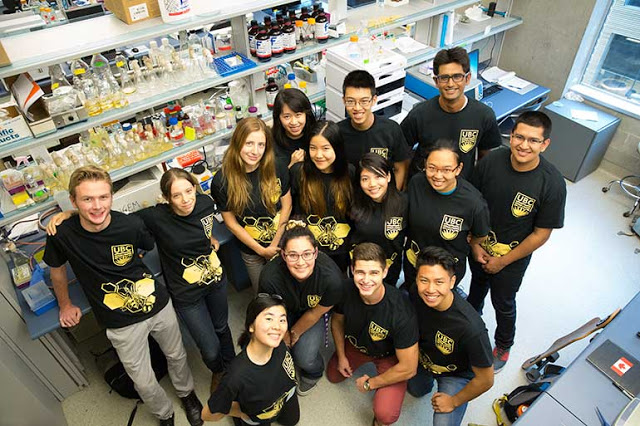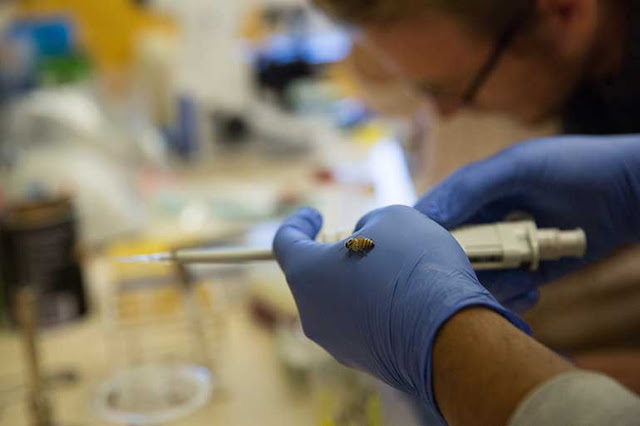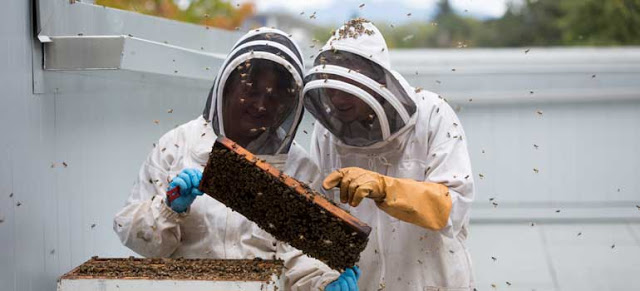Probiotics Being Researched to Stop Bee Die-Off From Pesticides
A group of UBC students is betting probiotics could be the key to protecting bees from death caused by harmful pesticides.
“We rely heavily on bees for our food. They pollinate more than $15 billion worth of crops in the U.S. every year, but they are dying at alarming rates,” said Yu Qing Du, a second-year engineering physics student. “We wanted to address an important issue with a worldwide impact.”
Du is part of a team of 20 engineering and science students that spent the summer developing a probiotic for honeybees, which they’ve coined the ‘pro-bee-otic.’
Many people take probiotics to increase the number of “good bacteria” in their digestive system. For their project, the students identified a species of bacteria that lives only in the gut of honeybees. They spent the summer trying to figure out how to genetically engineer the bacteria to break down neonicotinoids, a type of pesticide that has been linked to bee death and is thought to contribute to colony collapse disorder.
“Neonicotinoids are the most widely used pesticides because it harms insects but not mammals like people,” said Jeanne Chan, a third year biochemistry student.
The students are taking their idea to the 2015 International Genetically Engineered Machine (iGEM) competition later this month in Boston. Over 200 teams from more than 30 countries will present new research on biologically engineered organisms. Teams are evaluated on a set of criteria by competition judges.
“The students find the iGEM experience both empowering in terms of what is possible and humbling in the work required for success,” said Michael Murphy, a professor of microbiology & immunology who is supervising the UBC team along with a number of graduate students. “After attending the competition students appreciate the importance of communication to all stakeholders in science and engineering.”
 |
|
Students involved the project are pictured in the lab. Photo: Michael VanInsberghe
|
Students are working with bacteria known as Gilliamella apicola and their biggest challenge is to turn it into a “probeeotic” that helps bees break down the toxic chemicals in pesticides.
 “It’s a difficult process because there’s not much research on the bacteria we’re working with,” said Darren Christy, a third-year biochemistry student. “We’ve been trying different ways to get the genes into the bacteria.”
“It’s a difficult process because there’s not much research on the bacteria we’re working with,” said Darren Christy, a third-year biochemistry student. “We’ve been trying different ways to get the genes into the bacteria.”
If they are successful, commercial beekeepers could one day mix the bacteria into a sucrose-water solution kept near the hives. The bees would ingest the bacteria and take it back to their hives where they would pass it on to the other bees in the colony when they regurgitate food or through social activities like cleaning.
Bee die-offs and the use of neonicotinoids have been in the spotlight recently. Just last week, a U.S. court overturned the Environmental Protection Agency’s approval of a type of neonicotinoid called sulfoxaflor because of its potential risk to bees.
 |
|
A bee is pictured inside the lab. Photo: Michael VanInsberghe
|
The student team is concerned about how their solution to this problem might be perceived by others given the concerns about genetically modified organisms.
“As it stands right now, pesticides are essential for modern agriculture,” said Du. “The European ban on neonicotinoids was recently temporarily suspended for 120 days in England to help farmers protect crops from the cabbage stem flea beetle. We need to keep exploring different avenues to deal with this issue.”



